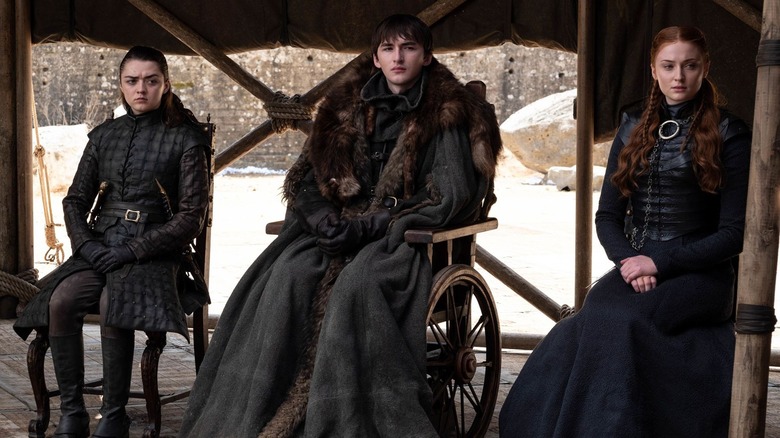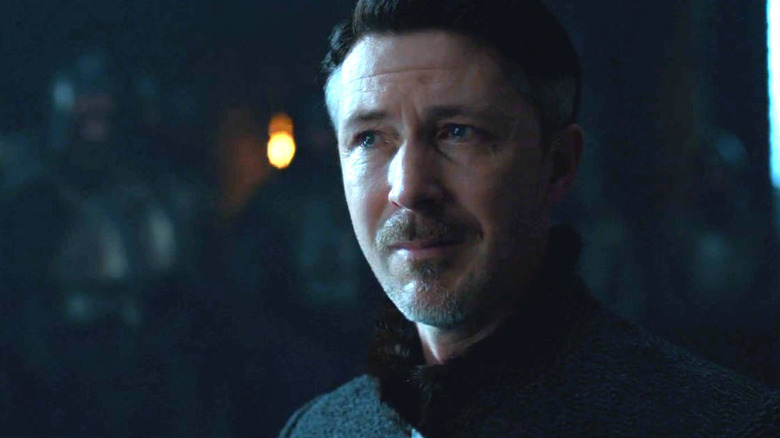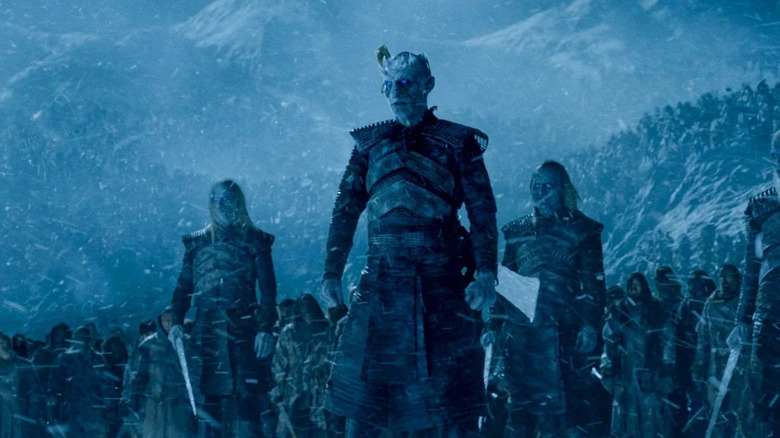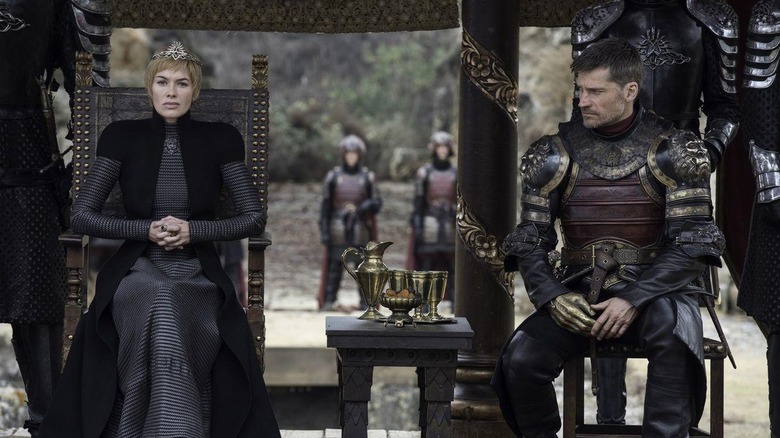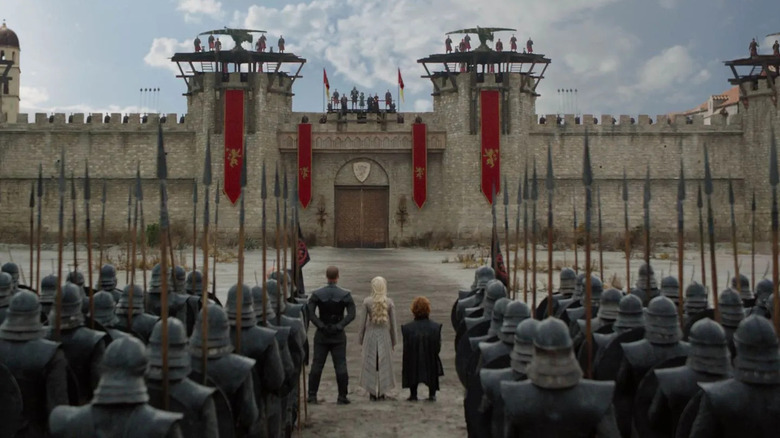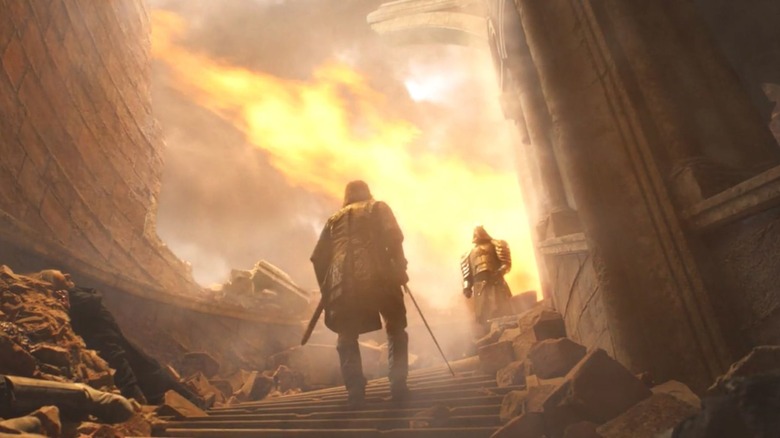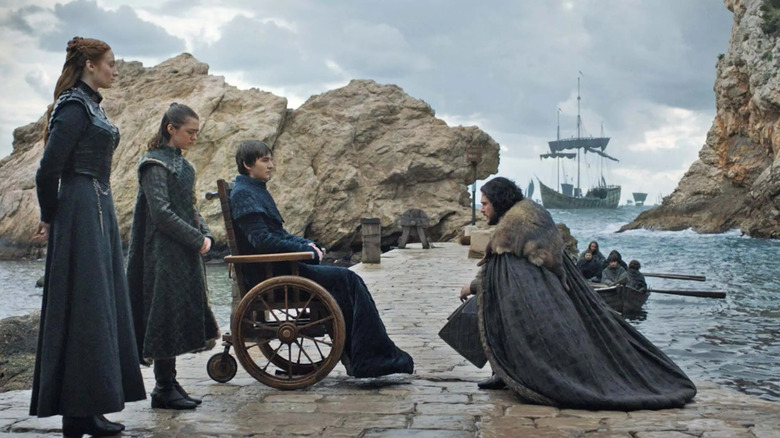Game Of Thrones Ending Explained: A Story Told In The Wrong Order
There really was nothing more exciting than that final six-episode run of "Game of Thrones." Over ten million viewers were tuning in live to each episode, blowing pretty much every other show on TV out of the water. At the time, if you needed to make small talk with a complete stranger, "What do you think's gonna happen on 'Game of Thrones?'" was a pretty easy way to get a conversation going.
Unfortunately, as we reached its finale, the show had done its best to kill the enthusiasm we had for it. The finale showed us fan-favorite character Daenerys (Emilia Clarke) at the height of her rushed, unconvincing turn to the dark side, which ended with Jon's (Kit Harrington) disconcertingly quick decision to murder her (for the common good!). The long-running question of who would end up on the Iron Throne was answered: Bran (Isaac Hempstead Wright), the least interesting character on the entire show. "Who has a more interesting story than Bran the Broken?" Tyrion (Peter Dinklage) asked in his final monologue of the show, and the internet was quick to answer: Everyone. Literally everyone had a more interesting story than him.
Where it went wrong
In the wake of the finale came a lot of critic "autopsies" trying to get to the core of what went wrong in that final season. How did a show with such consistently good audience ratings drop so far, so quickly?
Although most fans agree that the acting and the special effects were as good as always, it was (as tends to be the case) the quality of the writing that really killed the show. Whereas characters like Littlefinger (Aiden Gillen) and Varys (Conleth Hill) used to have sharp dialogue and a clear air of wisdom about them, they both gradually devolved into useless idiots the moment the show ran out of their book material around season 5. Tyrion was turned from a morally complex character to a generic good guy, Sansa was robbed of the inherent kindness that made her book counterpart so special, and Cersei — one of the most iconic villains in all of television — was given almost nothing to do in the final season. In fact, pretty much every character on the show had turned into a more one-dimensional, significantly less interesting version of themselves by the time we got to the finale.
Although the show's missteps are endless, most of the issues with season 8 came down to a single questionable story choice decided in season 7, one that essentially guaranteed an anti-climactic finale the moment it was made: Cersei should've been dealt with first, not the White Walkers.
The threat of the White Walkers
One of the big thematic throughlines of the whole show was that almost all the main characters were so focused on their quest for political power that they weren't paying enough attention to the existential threat coming for all of them from the north. The political maneuvering that felt so important was supposed to be a distraction; getting to sit on the iron throne wouldn't matter much when all your subjects had been turned into ice zombies.
By defeating the White Walkers halfway through the final season without many major casualties, the show undermined that theme. As it turned out, it was okay for most of the characters to ignore the White Walker threat for seven seasons straight. The selfishness of so many of the main characters never had any consequences; humanity was perfectly safe after all. And once the Night King was handily destroyed, they went straight back to the petty political power games as if none of that had ever happened.
Not only did it come across as an anti-climax, but it made the episodes afterward feel like an extended epilogue. The main threat to all these characters had been defeated, the story felt like it was winding down, but the show was still having Daenerys go through a major last-minute character-defining personality change that felt disconnected from everything that had come in the seven and a half seasons beforehand. Throughout the fourth episode of season 8, "The Last of the Starks," Daenerys went from a war hero who just risked everything to help Winterfell, to a desperate and insane tyrant ready to burn countless civilians to get the throne.
This transition felt unnatural not just because of how quickly it happened, but because it didn't feel like her quest to take down Cersei should've been anywhere near as hard as it ended up being. It was like watching someone climb a whole mountain and then have a breakdown over a small flight of stairs.
The temporary truce
The moment the show truly doomed itself was in the end of season 7, when they had our heroes decide to form an uneasy truce with Cersei so they could focus first on the White Walkers. Although Cersei didn't honor her promise to send troops to help, at least we knew she wouldn't be in the way when the Night King came. Whereas there were signs of the frustration that would lead to Daenerys' eventual descent into madness in season 7, the final few episodes showed her making a clear, seemingly definitive step away from that, rejecting her quest for power for the sake of the greater good.
The first two episodes of season 8 then focused on the build-up to the big, climactic battle at Winterfell, which happened throughout the entirety of "The Long Night." On its own, I personally didn't have any major issues with the way this episode panned out. The decision to have Arya be the one to kill the Night King got a lot of pushback from fans, but I thought it worked just as well as having anyone else do it. I wasn't disappointed that Jon didn't get to land the killing blow, because hey, he'd managed to gather everyone together to fight the White Walkers off; he'd already done his part.
The problem was that the episode left the show in an impossible place: there were now three episodes left to deal with Cersei, a villain who felt so much smaller than the massive existential threat of the Night King. Cersei was someone with barely any allies, whose army was easily outmatched by the heroes. Based on everything the show had established so far, defeating her should've been easy.
The writers pushing the scales
Showrunners D.B. Weiss and David Benioff seemed aware of this issue, which is why they did everything they could to make the war against Cersei seem way harder than it should've been. They had Daenerys lose a second dragon through a contrived scene where the Iron Fleet surprise attacked her while she was flying Drogon (leading to the infamous "Dany kind of forgot about the Iron Fleet" explanation from Benioff). Soon after, the Iron Fleet surprise attacked the ship with Tyrion, Grey Worm, and Missandei on board. Tyrion and Grey Worm managed to swim safely to a nearby island (somehow no part of the fleet went after them) whereas Missandei was somehow left on board and taken hostage.
It was an incredibly rushed, contrived sequence of events (how does a fleet sneak up on you?) made even more disappointing by how obviously we could see the writers pulling the strings. They needed to make Daenerys' descent into insanity feel believable, so they threw every misfortune at her whether it made sense or not. This became clearer looking back at the whole season and realizing that Dany's troop count changed drastically depending on what the script wanted us to think of her. When they wanted her to be desperate in episode 4, her army was small, tired, just barely hanging together. When we were supposed to feel horrified about how mad with power she'd gotten in episode 5, her army was suddenly larger and full of energy.
All of these issues felt like the symptoms of the self-imposed constraints the showrunners put on themselves. They chose to give themselves only one full episode to show Dany's descent into madness, just as they chose to let the higher-stakes storyline resolve itself early on.
What if Daenerys' descent had come first?
In the years since the show ended, this one question has tortured me: what if instead of devoting the final two episodes in season 7 to a storyline where Jon travels north of the Wall to capture an ice zombie in an attempt to convince Cersei of agreeing to a truce, season 7 ended with Daenerys taking over King's Landing?
It's not hard to imagine a different season 7 where Daenerys, frustrated by how poorly her attempts to humanely conquer Westeros had gone so far, decided to reject Jon's advice of focusing on the White Walkers and go full Mad Queen in the season 7 finale. This would've put the show in a much more interesting place going into the final season: Daenerys would be given narrative time to reckon with what she'd done, and Jon would be forced to figure out how to navigate this new dynamic. Daenerys may be a war criminal, but Jon would still need her for her army and her dragons to save humanity.
From a quick glance at the audience reactions to the final season, you'd think it was the decision to turn Daenerys evil that pissed everyone off. While this choice would undoubtedly be controversial no matter how they did it, the real problem was that the writers never dealt with her turn in an interesting way. Instead of having her gradually turn into the Mad Queen over the course of the entirety of season 7 and then dealing with the fallout in season 8, the writers crammed it all into three episodes.
In the actual finale of "Game of Thrones," the show didn't have time to give Daenerys any proper reaction to what she'd done. They could've had her show some guilt or regret, but because there was only forty minutes left and they needed to wrap things up, the writers gave us a version of Dany with zero self-awareness left. They were forced (as in, forced by themselves) to turn Dany into a cartoon villain.
No time to deal with tough questions
You can see how the writers' motivation affected the previous "Game of Thrones" episode, where they could've just shown Dany not caring about the civilian casualties as she flew straight towards the Red Keep in a rage. That alone would've been enough to show that she'd gone over the edge — but instead, they showed her going out of her way to needlessly burn a bunch of men, women, and children who weren't doing anything to provoke her. It wasn't enough for her to be in the wrong; she had to be so aggressively, undeniably in the wrong that the show could justify not spending any more time on the character.
Imagine instead if the characters still had the threat of the White Walkers to deal with, if Dany's moral downfall came with the added tragedy of her having divided and weakened our main characters at the time where they needed her most. "Game of Thrones" was always at its best when dealing with tough, complicated questions, and "is it possible for Dany to redeem herself?" would've been such an interesting dilemma for the final season to chew on. It's extra frustrating because there could've been time to explore this story if the writers hadn't forced themselves into a different direction back in season 7.
This narrative change wouldn't have fixed everything that went wrong in that final "Game of Thrones" season. There was still the issue of the show's increasingly terrible dialogue, the writers' insistence on providing fan service even if it didn't make sense, and the showrunners' apparent disinterest in providing any kind of unique or interesting commentary on the nature of power. But all the most unforgiveable sins of the final season came down to one problem: the writers told the story in the wrong order.
